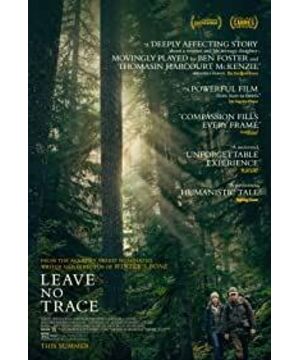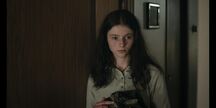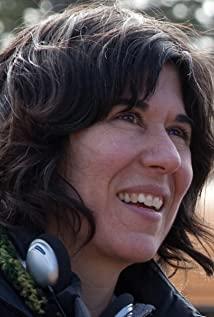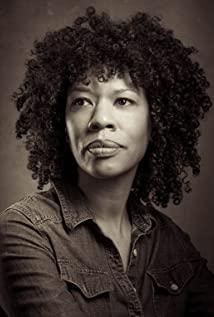The film "leave no Trace" (leave no trace) is a feature film directed by Debra Granick , based on Peter Rock's novel of the same name. Starring Ben Foster and Thomasin McKenzie, it was released in the United States on June 29, 2018. Director Debra Granick, as a Sundance independent film professional, has always been concerned with marginalized groups. Following "Winter' Born" (Winter' Born), this time focusing on PTSD patients, this time it is restrained and tender about a father with incurable PTSD, living in a forest park with his 15-year-old daughter , the story of how their lives have been turned upside down since their daughter was unintentionally seen by a stranger.
The father in the film is a post-traumatic sequelae, away from the crowd, living alone in the mountains is the only way he can live a normal life. The breeze at the beginning of the film, sporadic birdsong, swaying branches, and large greens show the living environment of the father and daughter. In addition, the father uses military camouflage three elements: color, shadow, shape and other similar military training to teach his daughter how to Survive in the wild. The seemingly peaceful and quiet life implies a crisis: the construction team on the roadside in the forest, and the rumbling sound of machines makes my father feel uneasy. Early one morning, her daughter was seen by a stranger who accidentally broke into the forest, which attracted the staff of the Forest Protection Association, and the two were separated for questioning. During the test, the daughter's advanced knowledge level surprised the members and suggested that in addition to knowledge, social skills should also be cultivated; the father took a series of psychological tests such as: "You have a great sense of collective honor", "Do you feel alienated?" Or cut off from others" and "you can't feel sadness or love", emotional breakdown, and eventually father and daughter are forced to accept humanitarian care. The government provided them with very good conditions: a well-decorated villa in a remote country, a few kind and friendly neighbors, a lucrative job and a colleague to help her daughter go to school. My daughter is also adjusting to modern life: learning to ride a bike, making new friends, participating in clubs, and everything seems perfect. However, the father showed strong resistance on the first day: he hid the TV in the cabinet, did not use any communication equipment, could not sleep all night, and fled with his daughter to the cold mountains in pain and anxiety. Due to the bad weather on the way, The daughter's physical strength was at stake, and the father did everything to protect his daughter's life and was finally saved. But the next day, the father fainted while going down the mountain to buy daily necessities, and the two were forced to live in a group again. But anyone's help would make the father miserable, so he offered to leave again. However, in this life experience at the foot of the mountain, the daughter was infected by the charm of group life and rejected her father's request. Although the father and daughter are deeply in love and reluctant to part, the two finally choose to respect each other's values, embrace reconciliation, and embark on different life paths.
The reason why this film has caused such a big response at the film festival is largely because it makes us re-examine modern civilization and cultural diversity, as well as problems that people tend to ignore or ignore.
(1) Analysis of the right to speak: mainstream culture and marginalized groups
"Cultural hegemony" is also known as "cultural leadership". Originally, Williams investigated it from an etymological point of view in "Keywords", mainly referring to "the political domination or control of one country over another country", and later Gramsci gave it a new meaning and was It is used to describe the dominance relationship between various classes in society. But this relationship of domination or domination is not limited to direct political control, but seeks to become domination more generally, including specific ways of looking at the world, human identities, and relationships. As a result, hegemony not only expresses the interests of the ruling class, but also penetrates into the consciousness of the masses and is accepted by subordinate classes or the masses as "normal reality" or "common sense". Similar to the well-known Fairclough discourse analysis framework, it proposes: "Discourse systematically constructs the objects it speaks through a series of statements and utterances, shaping our perception of related things (including people) and ourselves. , influence and even determine the way we value and behave. Discourse is considered a form of social practice, which is imperceptible but powerful, ideology and power implicit in discourse”.
Every social civilization in which people live will have an output of mainstream values and mainstream culture, and they always occupy a dominant position in discourse. Group society has always been the environment in which most people live. Goffman's "Drama Theory" implies that people's specific behavior will change according to changes in social situations; Luin's "Human Behavior Field Theory" also In the explanation: "human behavior is the product of social environment"; Mead's "social interaction theory" further explains: individual socialization is an indispensable condition for growth, and it is the turning point for individuals to move towards groups and even larger social organization systems . The influence of mainstream values on us is even more subtle. Relying on strong propaganda and pervasive education, people take it for granted that human beings can have today's creations thanks to group living, so human beings should learn to adapt to society, integrate into society, learn to communicate with people, interact and coexist, and human beings should abandon the backwardness. way of life, the pursuit of modern civilization. But the advocacy of dominant cultural ideals doesn't mean that what's on the fringes is wrong.
Although we have bid farewell to the colonial era of imperialism, spiritual aggression and cultural hegemony are still a major feature of today's post-colonial era. The father in the film is not only a representative of a minority group of veterans with PTSD, but also a typical example of a marginal group who advocates mountain life; while the humanitarian is not only the leader of mainstream culture, but also the epitome of modern civilization. The lifestyles of marginalized groups represented by fathers are obviously considered by humanitarians to be inconsistent with the mainstream or even wrong. They try to change their behaviors and values through relief and assistance, hoping that they can be attached to modern civilization. A series of government assistance to the father and daughter, they are so enthusiastic, mainstream, positive energy, full of humanitarian care, and polite when talking to the father and daughter. It seems to be helping them from the standpoint of respect, but in fact it is just that people take for granted the right idea of life and try to educate them, which is completely contrary to the idea of life that we advocate respecting diversity. Humanitarian rescuers have never thought about whether the people they enthusiastically help need their "relief" or not, and whether their humanitarian care is helping the marginalized or destroying them. In the film, the conflict between the two is mainly reflected in two places:
The first is to assist minors in welfare institutions. The daughter said her home was in the forest, but the girl who spoke to her thought that meant she had no home, and the family should live in a house instead of a tent in the forest. Through the child's perspective, the director shows us the incomprehension, disapproval and disapproval of marginalized groups in the mainstream culture. In recent years, the most popular and typical minority group is LGBT. From "Brokeback Mountain" and "The Life of Adele" to "The Danish Girl", "Call Me By Your Name" and this year's "Love, Simon," these films reflect LGBT in some way The real life situation of most people in the group: pretending to be "normal" and trying to integrate into the mainstream society to avoid all kinds of discrimination, exclusion, physical violence and mental harm from relatives, friends and strangers. But the repression of the nature also brings huge trauma to the soul. "Don't Let Me Go", adapted from Kazuo Ishiguro's novel of the same name, is about a group of clones that are more marginal and cannot even be treated equally as "human beings": not accepted, not recognized, let alone respected, their fate is die. Identity attributes determine the fate of the group: their lives are identified as "walking organ savers" - providing organs for "normal people" until they die of life failure. These small groups that are presented to us are still like this. What is the situation of their survival for thousands of people who are more marginal? can not imagine.
In another, after the father and daughter were found, government officials flattened their tents in the forest and houses built by a small group of loners nearby. The "why" shouts of these small groups on the fringes of society are overshadowed by the rumble of machines. Their desperation is reflected in the shattered remains. It seems that modern civilization is silently announcing: If you don't want to integrate, you won't be respected. The father in the film is well aware of the rules of communication under modern civilization, and on the surface he cooperates with all arrangements made by humanitarians, but warns his daughter when there is no one: behind the apparent full cooperation is in exchange for personal space and freedom. In the end, he found that mainstream culture permeated every corner of his life, and the humanitarian's care was more like a chronic poison, gradually eroding the loneliness and freedom he pursued. Isn't this the best proof of the unscrupulous crushing of marginalized groups by mainstream culture? Isn't this the hegemonic act of the dominant mass culture oppressing the niche culture? Some groups of people prefer to be forgotten than to be remembered, but under the domination of cultural hegemony, the dominant discourse system always seeks its ideology and power to surround everyone.
From cultural conflicts between countries, to conflicts between independent individuals, conflicts and oppression are being staged almost all the time in terms of values. There is an intriguing detail in the film: the daughter is not as repulsive to the modern society as her father is, and her curiosity reveals the difference in values between the two. The behavior of the two after returning to the forest was to play chess. This game is more like a contest between a daughter's rapid growth, accepting new things and modern civilization and her father's values of living in the mountains. As the embodiment of defecting from mainstream culture, the father took his daughter to escape the life and role arranged for them by the government, but the daughter's attitude changed fundamentally in the process of escaping. At the beginning, the daughter followed her father step by step. Later, with the awakening of self-awareness, the trust taught by her group life, and the warmth brought by modern civilization, the daughter began to re-look at the world her father had been fleeing from another perspective. The father, who was originally a marginal and disadvantaged cultural symbol, became the mainstream value symbol in the small group of the two of them. The conflict between the daughter's growth choices and the father's values is like the awakening of another cultural consciousness trying to get rid of the cultural dictatorship. From the details, we can see that the director has deep intentions, and the film once again reflects the influence of discourse hegemony everywhere.
Today, we advocate the protection of cultural diversity and respect for individual independence. But in real life, when we encounter the same situation, can we truly agree that there is no distinction between different groups, and can we truly respect the concept and behavior of diversity? It is worth mentioning that at the end of the film, the director has placed hope for a better future by creating a group that pursues the most typical cultural diversity: the female tenant will regularly deliver life to those who pursue living alone in the forest like a father. At the same time, it provides a place for groups who enjoy living in groups and advocating civilization. The life of the entire population is like a communist society with highly developed cultural literacy, full of harmony, respect, care and comfort.
The film does not praise mavericks, nor does it criticize mainstream mediocrity. Rather, we should not feel how bad those who return to mainstream culture are, just as we should also respect those non-mainstream cultures and values. In the past, in order to survive, human beings were closely linked, and went through the era of hunting and farming, and came to the era of modern civilization. Today, the greatest gift that civilization brings to human beings is: human beings do not have to live closely together. What we look forward to in a more progressive and more civilized world is to allow different groups to enjoy their own happiness, and everyone has a choice to do or not The right to be an island, because that is freedom. As the film sings "Angel of Mercy": "we both share a moon and a star, maybe you safe may we both find a place with a heart".
View more about Leave No Trace reviews











